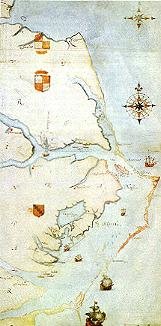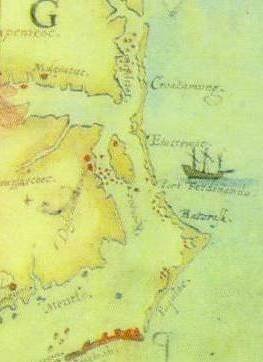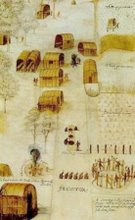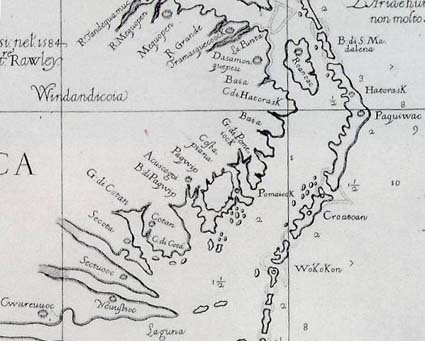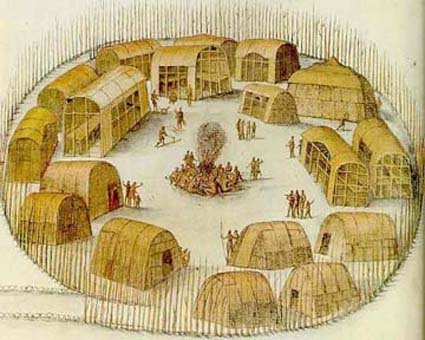Generational Surnames and Autosomal DNA Matching
By Roberta Estes
My interest in this topic is due to the number of adoptees I work with. DNA testing for genetic genealogy often represents the best, if not the only hope to adoptees of finding their genetic families.
I'm working with a woman who has two possible surnames to work with. Both are possibilities and the answer could be that neither of these surname is the right one. However, I've managed to put together some genealogy on both lines and I wanted to know how often people are finding matches in the genealogy data bases at Family Tree DNA and at 23andMe for their surnames represented by their parents, their grandparents, and their great-grandparents. For this exercise, I don't care how many matches to each surname they have, only IF they have any match to that surname.
For example, if your parents surnames are Smith and Jones, for example, and you have any matches that include the surnames Smith or Jones in their surnames listed as their ancestors, the answer is yes. If both Smith and Jones have matches, then you have 2 for 2 in the first generation.
The second generation, grandparents, includes 4 surnames, the 2 represented by your parents plus two more, your mother's mother's surname (Anderson) and your father's mother's surname (Ferverda), for a total of 4. If Smith and Jones are already represented, then we need to determine if Anderson and Ferverda have matches. Let's say neither do, so for this generation, you have 2 of 4 possible.
For the great-grandparents generation, we add 4 more ancestors, for a total of 8. Let's say that those surnames are Moore, Brown, Quincy and Scott and let's say that only Scott shows up in the list of surnames of your matches. So for this generation you have 3 of 8, your two parents, plus Scott.
The real question here is what is the likelihood that someone who is adopted will find their biological surnames in the surnames listed by their matches.
An ad hoc survey on both the ISOGG and the DNA-Genealogy lists in January 2012 received results for a total of 57 people who had been tested. A couple of people provided only partial information for a variety of reasons, so the totals in each group are slightly different.
Of the group who replied, for the first generation, their parents, the following was found:
20 people had no matches to their parents surnames
21 people had one match to their parents surnames
14 people had matches to both of their parents surnames
What this means to adoptees is there is a 38% likelihood that none or one of your parents surnames are represented in your matches. There is a 25% likelihood that both of your parents surnames are listed. Overall, there is a 64% likelihood that you will find at least one of your parents surnames listed in your matches. Of course, the question remains, which surnames are which.
Moving to the second, grandparents, generation we find the following.
16 people had zero matches to any of their 4 grandparents surnames
14 people had 1 match to their 4 grandparents surnames
11 people had 2 matches to their 4 grandparents surnames
7 people had 3 matches to their 4 grandparents surnames
6 people had matches to all 4 of their grandparents surnames
This means that there is a 30% chance that none of your parents or grandparents surnames are found among your matches. However, there is also a 70% chance that at least one of your grandparents surnames will be found among your matches. There is only a small chance, 7%, that all 4 of your grandparents surnames will be found among your matches.
Moving to the third generation, great-grandparents, we find the following:
11 people had zero matches to any of their 8 great-grandparents surnames
9 people had 1 match to their 8 great-grandparents surnames
6 people had 2 matches to their 8 great-grandparents surnames
12 people had 3 matches to their 8 great-grandparents surnames
7 people had 4 matches to their 8 great-grandparents surnames
4 people had 5 matches to their 8 great-grandparents surnames
2 people had 6 matches to their 8 great-grandparents surnames
4 people had 7 matches to their 8 great-grandparents surnames
1 person had matches to all 8 of their great-grandparents surnames
There is a 20% likelihood that none of your parents, grandparents or great-grandparents surnames will be found among your matches. However, there is also an 80% likelihood that at least one of those 8 surnames will be found among your matches.
The results of the 3 generation, 8 surname survey, when plotted, take the shape of the traditional bell shaped curve, with a lump that would likely smooth out with more samples. Twenty one percent of the people will find 3 of their 8 grandparents surnames among their matches.
Most people told me where they tested, or I could easily discern the information due to the test name. Many of them also included their total number of matches. The total of matches at 23andMe was, as a rule, was between 4 and 5 times the number of matches at Family Tree DNA. However, the commentary was pretty uniformly that people were disappointed with the contacts, or lack thereof, at 23andMe, in general, and when contact was made, that many had either no interest in or little information on their genealogy, rendering the contact useless or nearly so. One person wondered why someone would test at Family Tree DNA if they weren't interested in genealogy, so the response problem is not unique to 23andMe clients.
Of the people who responded to the survey, 13 of them had tested at both 23andMe and Family Tree DNA. Those results are included separately. Of these at the 8 surname level, there were a total of 21 matches at Family Tree DNA and 34 matches at 23andMe, so testers are obtaining more surname matches at 23andMe, but only about one third more, not in proportion to the 400% to 500% more matches than at Family Tree DNA. This is likely a direct reflection of the number of people at 23andMe that are interested in the health information and not in the genealogical aspect. However, one would think that if they went to the trouble to enter their surnames, they would have some interest in family history.
Interesting aspects were that maybe half of the people had some complicating factor, such as a highly endogamous population or a patronymic population, both of which clearly affect the potential of finding matching surnames. Equally as interesting was the one man who had no matches for any of his 8 grandparents surnames but had relatively "vanilla" colonial American surnames.
As both data bases increase in size, I would expect the numbers and percentages of matches to rise as well. The message here is that today, in January of 2012, for adoptees, there is about a 38% chance that one of your parents surnames is found among your matches, a 64% chance that one or both of your parents surnames will be found, a 70% chance that one or more of your grandparents surnames will be found and 80% chance that one or more of your great-grandparents surnames will be found.
This blog is © History Chasers
Click here to view all recent Lost Colony Research Group Blog posts 


